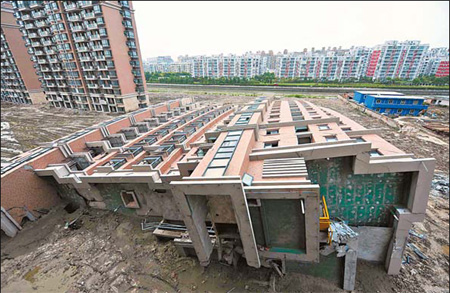flash
Shanghai building topple trial begins
By Qian Yanfeng and Cao Li (China Daily)
Updated: 2010-02-02 08:14
 |
Large Medium Small |
|
 The collapsed building of the Lotus Riverside residential complex in Minhang district, Shanghai. The building fell to its side nearly intact on June 27, 2009, leaving one migrant worker dead. [China Daily/Gao Erqiang] |
SHANGHAI: Six suspects held responsible for the collapse of an unfinished residential building last June in the city's Minhang district went on trial yesterday.
The six were charged by the Shanghai Minhang district prosecutors' office with causing a major accident. According to Chinese law, a person charged with this crime faces a maximum of seven years' imprisonment if convicted.
The two-day trial continues today.
Around dawn on June 27, 2009, a 13-story unfinished building in Lotus Riverside residential complex in suburban Minhang district fell over, almost intact, killing one migrant worker.
The Minhang district prosecutors' office said the accident caused economic losses of nearly 20 million yuan, including 6.7 million yuan in construction costs for the collapsed building and 12.7 million yuan in compensation to the home owners.
The prosecutors' office said in the indictment that in November 2008, Qin, under Zhang Zhiqi's instruction, subcontracted earthwork excavation for the underground garage to Zhang Yaoxiong, who did not have a license for the job.
The two also told Zhang Yaoxiong to pile the dug-out soil to the north of the collapsed building, whose foundations was undermined by a combination of piled-up mud nearly 10 meters high on the one side, and an underground excavation for the parking garage on the other.
Zhang Yaojie, head of Shanghai Zhongxin Construction Company Ltd, along with Xia and Lu who oversaw the project, failed to stop the developer from subcontracting part of the construction work to an unlicensed subcontractor, the office said. Qiao Lei as the project supervisor also failed to stop the bad construction practices and did not notify the related departments in charge.
During the trial yesterday, Zhang Yaojie said he discovered the potential danger of the piled-up mud and notified related departments of the construction company before the building collapsed.
Qin also defended himself, saying he did not know that Zhang Yaoxiong did not have a license for the excavation work.
Another two suspects, Zhang Zhiqi and Que Jingde, who were the head and a director on the board of Meidu respectively, did not stand trial yesterday.
Que, the second largest shareholder in the building's development, was previously revealed to be an assistant to the director of Minhang's local Meilong town government.
According to the official website of the Minhang district government, a person with the same name Que Jingde is the "assistant to the director of Meilong town".
According to previous media reports, the 51-year-old has held various government posts in previous years, including head of the Meilong Town Land Requisition Department, general manager of Meilong Town Asset Management Co, and chief at the Meilong demolition and relocation office for the Shanghai-Hangzhou Maglev Project.
Que was arrested in August last year on graft charges.












